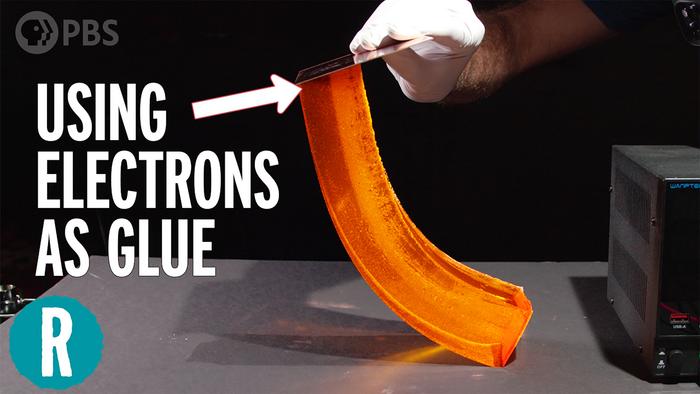WASHINGTON, July 15, 2024 — How would you stick a slice of banana to a sheet of copper? Until a few months ago, you couldn’t. But a new discovery called “hard-soft electroadhesion” enables chemists to stick almost any hydrogel to almost any metal, using nothing but an electric current. And you can unstick the materials simply by reversing the current. Recently reported in ACS Central Science, this astonishingly general phenomenon works with a wide variety of gels (including fruits, vegetables, meat and fish) and conductors (including metals and graphite). Join our host George as he attempts to replicate electroadhesion in his basement and tries to discover what — if anything — this remarkable phenomenon shares with superglue.

Credit: The American Chemical Society.
WASHINGTON, July 15, 2024 — How would you stick a slice of banana to a sheet of copper? Until a few months ago, you couldn’t. But a new discovery called “hard-soft electroadhesion” enables chemists to stick almost any hydrogel to almost any metal, using nothing but an electric current. And you can unstick the materials simply by reversing the current. Recently reported in ACS Central Science, this astonishingly general phenomenon works with a wide variety of gels (including fruits, vegetables, meat and fish) and conductors (including metals and graphite). Join our host George as he attempts to replicate electroadhesion in his basement and tries to discover what — if anything — this remarkable phenomenon shares with superglue.
Reactions is a video series produced by the American Chemical Society and PBS Digital Studios. Subscribe to Reactions at and follow us on X, formerly Twitter @ACSReactions.
The American Chemical Society (ACS) is a nonprofit organization chartered by the U.S. Congress. ACS’ mission is to advance the broader chemistry enterprise and its practitioners for the benefit of Earth and all its people. The Society is a global leader in promoting excellence in science education and providing access to chemistry-related information and research through its multiple research solutions, peer-reviewed journals, scientific conferences, eBooks and weekly news periodical Chemical & Engineering News. ACS journals are among the most cited, most trusted and most read within the scientific literature; however, ACS itself does not conduct chemical research. As a leader in scientific information solutions, its CAS division partners with global innovators to accelerate breakthroughs by curating, connecting and analyzing the world’s scientific knowledge. ACS’ main offices are in Washington, D.C., and Columbus, Ohio.
To automatically receive news releases from the American Chemical Society, contact newsroom@acs.org.
Follow us: Twitter | Facebook | Instagram



